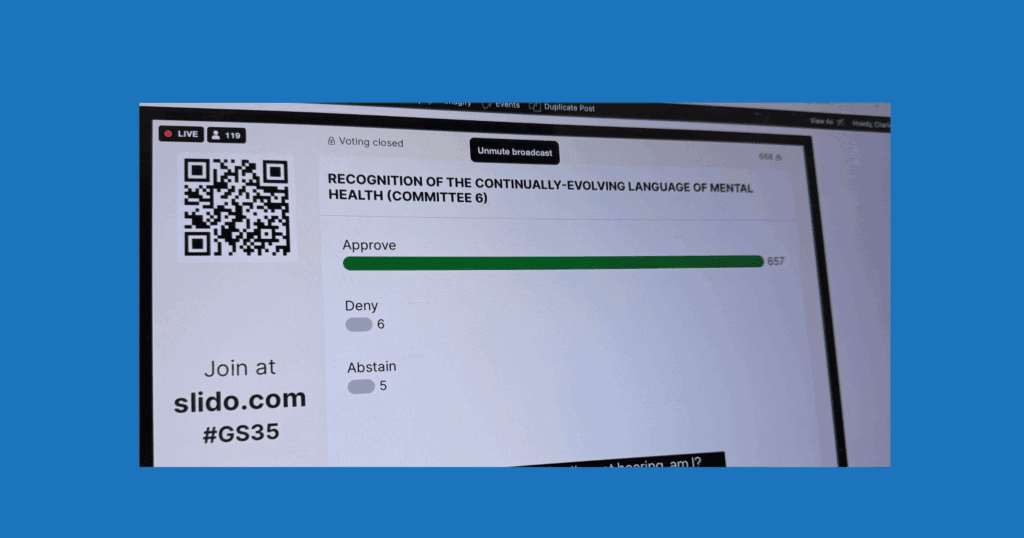Resolution of the Continually-Evolving Language of Mental Health passes
Conversations around mental health will get — if not necessarily easier — a lot more just and compassionate for those struggling with and/or in a mental health crisis.
On July 14, General Synod delegates overwhelmingly approved the Resolution of the Continually-Evolving Language of Mental Health. The resolution, proposed by the Mental Health Network of the United Church of Christ, cited the growing need for congregations to be aware of the ever-evolving language and the harm historically done by words.
Such need for awareness on the most current — and always changing — terminology was evident during the resolution committee discussion as Committee 6 delegates debated over terms such as “mental health” versus “mental wellness” and, whether calling someone disabled was still correct or not. The conversations illustrated perfectly why such a resolution was being brought forth at the General Synod.
Abbie Chronister, vice chair of the Mental Health Network board, acknowledged that the resolution was not perfect, adding that “no amount of deliberation of the resolution language itself would make it a perfect document.”
“Rather this resolution on the evolving language of mental health was created to start conversations,” said Chronister. “The goal is to open the conversation and to look at language that is person centered.”
Stories shared on the plenary floor
Jane LoBrutto of the Vermont Conference presented the resolution for vote to Synod on July 14, echoing Chronister’s words that “it is not a perfect document, but rather an excellent place to start.”
LoBrutto noted that in the educational intensives that happened days before, delegates forming the resolution’s Committee 6, heard from health experts how language used when someone is in crisis can make a difference.
“The resolution seeks to encourage others to ask questions of the person in need of help and to never assume anything,” said LoBrutto.
The floor was then opened for delegates to speak for or against the resolution, with support overwhelming for it. Some delegates boldly shared their own stories of the hurt and judgement they had received by misguided language used by those who were to help them. One delegate from Southern New England Conference spoke how as a teen a high school guidance counselor labeled her mother, who was battling substance abuse, a “junkie.”
Ellie Smith, a youth delegate from the Rocky Mountain Conference also stepped up to the microphone and told how as a teen herself experiencing anxiety she no longer wanted to hear the sentiment that “all teens are anxious.”
“It is vital that the language we will use helps us,” she said.
A friendly amendment is voted down
Before voting took place there was a call from the floor for a friendly amendment seeking to add the biblically grounded the word “shalom” to the references “mental health” found in in lines 69, 81, 85 and 91 of the resolution. The result would be the lines reading as “mental health and shalom.”
The amendment was denied with a total of 545 votes (77 approved and 44 abstained). Majority opinion was that, as cited by the authors of the resolution, the document’s purpose was to be a starting point for conversations, which are not only continually evolving, but different in each context.
The resolution passed with 657 approved votes, 6 denied and 5 abstained.
Content on ucc.org is copyrighted by the National Setting of the United Church of Christ and may be only shared according to the guidelines outlined here.
Related News
Ashes to Ashes
Some weeks more than others the sense that the “world is burning” is hard to shake. The...
Read MoreUnited Church Homes receives $15,000 in grants to expand NaviGuide services for the elderly and their families
United Church Homes (UCH), a national nonprofit senior living organization headquartered in...
Read More‘A Season for Spiritual Preparation’: Rev. Karen Georgia Thompson offers Ash Wednesday reflections
The Rev. Karen Georgia Thompson, United Church of Christ General Minister and President/CEO,...
Read More


